Gun Ownership: An Analysis of Motivations, Laws, and Incidents
VerifiedAdded on 2022/08/18
|12
|3813
|11
Essay
AI Summary
This essay delves into the multifaceted issue of gun ownership in the United States, examining the motivations behind owning firearms, the legal landscape, and the resulting impact on violence. The study explores the arguments for and against gun ownership, including the Second Amendment, self-defense, and the role of fear. It analyzes the psychological and behavioral perspectives of gun ownership, including the perceived risks, phobias, and the desire for power. The paper presents evidence regarding the rates of homicides, mass shootings, and suicides, and their relationship with gun ownership percentage. The essay argues that widespread gun ownership is linked to increased gun-related violence, and suggests that gun ownership should be limited to law enforcement and trained professionals to ensure responsible use. The essay also examines the role of political views and public opinion on gun laws and regulations, and discusses the impact of gun ownership on happiness and well-being.
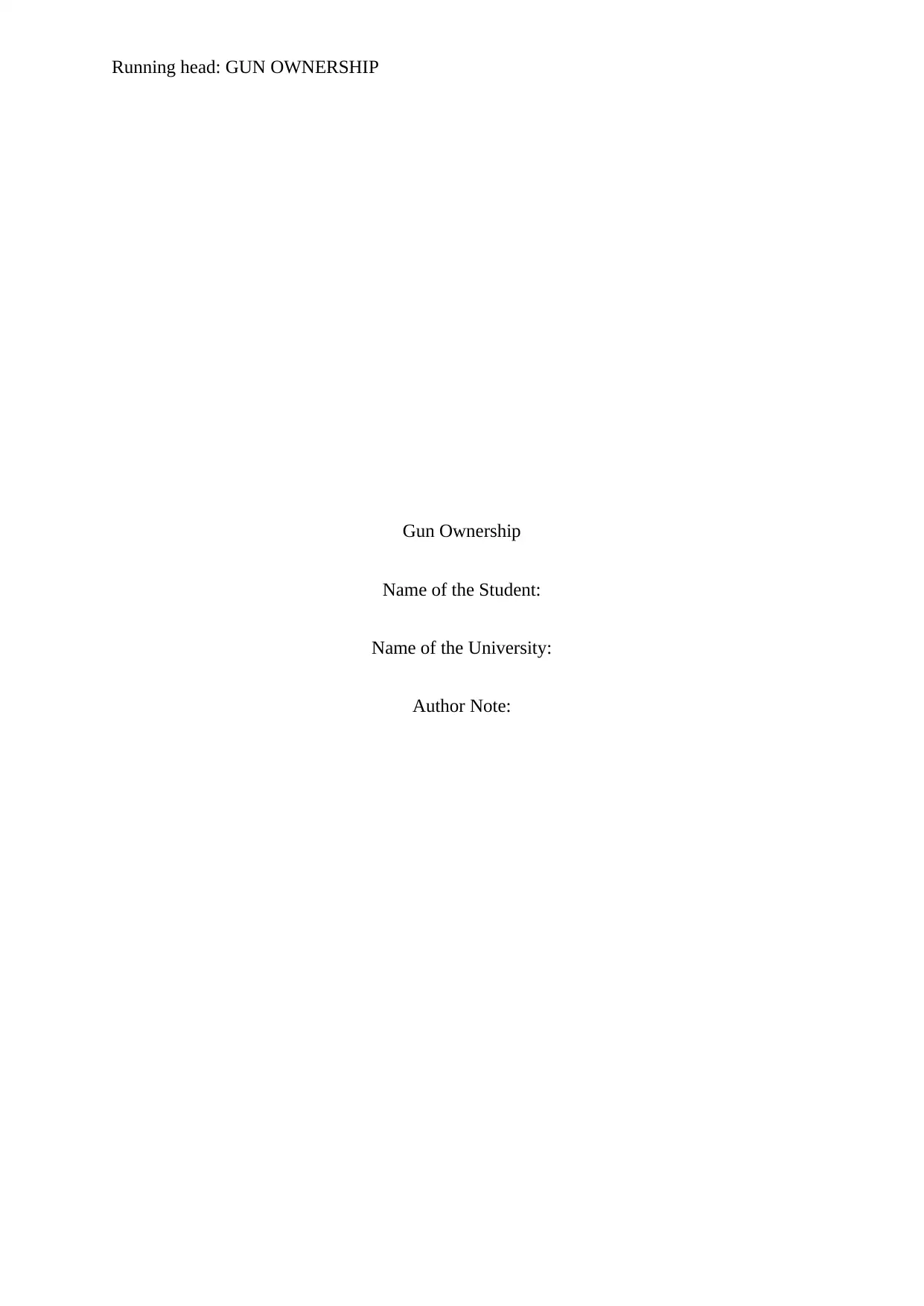
Running head: GUN OWNERSHIP
Gun Ownership
Name of the Student:
Name of the University:
Author Note:
Gun Ownership
Name of the Student:
Name of the University:
Author Note:
Paraphrase This Document
Need a fresh take? Get an instant paraphrase of this document with our AI Paraphraser
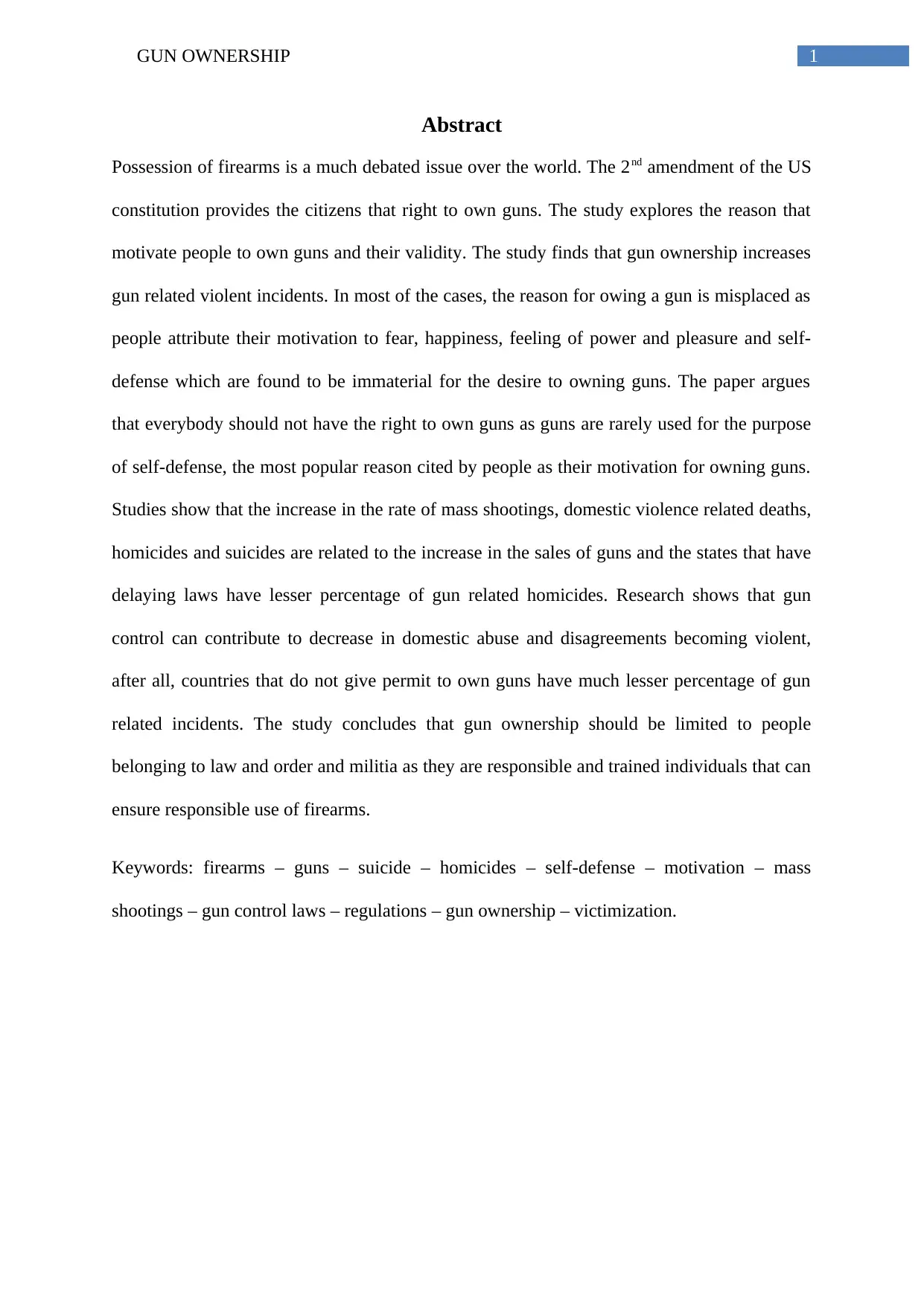
1GUN OWNERSHIP
Abstract
Possession of firearms is a much debated issue over the world. The 2nd amendment of the US
constitution provides the citizens that right to own guns. The study explores the reason that
motivate people to own guns and their validity. The study finds that gun ownership increases
gun related violent incidents. In most of the cases, the reason for owing a gun is misplaced as
people attribute their motivation to fear, happiness, feeling of power and pleasure and self-
defense which are found to be immaterial for the desire to owning guns. The paper argues
that everybody should not have the right to own guns as guns are rarely used for the purpose
of self-defense, the most popular reason cited by people as their motivation for owning guns.
Studies show that the increase in the rate of mass shootings, domestic violence related deaths,
homicides and suicides are related to the increase in the sales of guns and the states that have
delaying laws have lesser percentage of gun related homicides. Research shows that gun
control can contribute to decrease in domestic abuse and disagreements becoming violent,
after all, countries that do not give permit to own guns have much lesser percentage of gun
related incidents. The study concludes that gun ownership should be limited to people
belonging to law and order and militia as they are responsible and trained individuals that can
ensure responsible use of firearms.
Keywords: firearms – guns – suicide – homicides – self-defense – motivation – mass
shootings – gun control laws – regulations – gun ownership – victimization.
Abstract
Possession of firearms is a much debated issue over the world. The 2nd amendment of the US
constitution provides the citizens that right to own guns. The study explores the reason that
motivate people to own guns and their validity. The study finds that gun ownership increases
gun related violent incidents. In most of the cases, the reason for owing a gun is misplaced as
people attribute their motivation to fear, happiness, feeling of power and pleasure and self-
defense which are found to be immaterial for the desire to owning guns. The paper argues
that everybody should not have the right to own guns as guns are rarely used for the purpose
of self-defense, the most popular reason cited by people as their motivation for owning guns.
Studies show that the increase in the rate of mass shootings, domestic violence related deaths,
homicides and suicides are related to the increase in the sales of guns and the states that have
delaying laws have lesser percentage of gun related homicides. Research shows that gun
control can contribute to decrease in domestic abuse and disagreements becoming violent,
after all, countries that do not give permit to own guns have much lesser percentage of gun
related incidents. The study concludes that gun ownership should be limited to people
belonging to law and order and militia as they are responsible and trained individuals that can
ensure responsible use of firearms.
Keywords: firearms – guns – suicide – homicides – self-defense – motivation – mass
shootings – gun control laws – regulations – gun ownership – victimization.
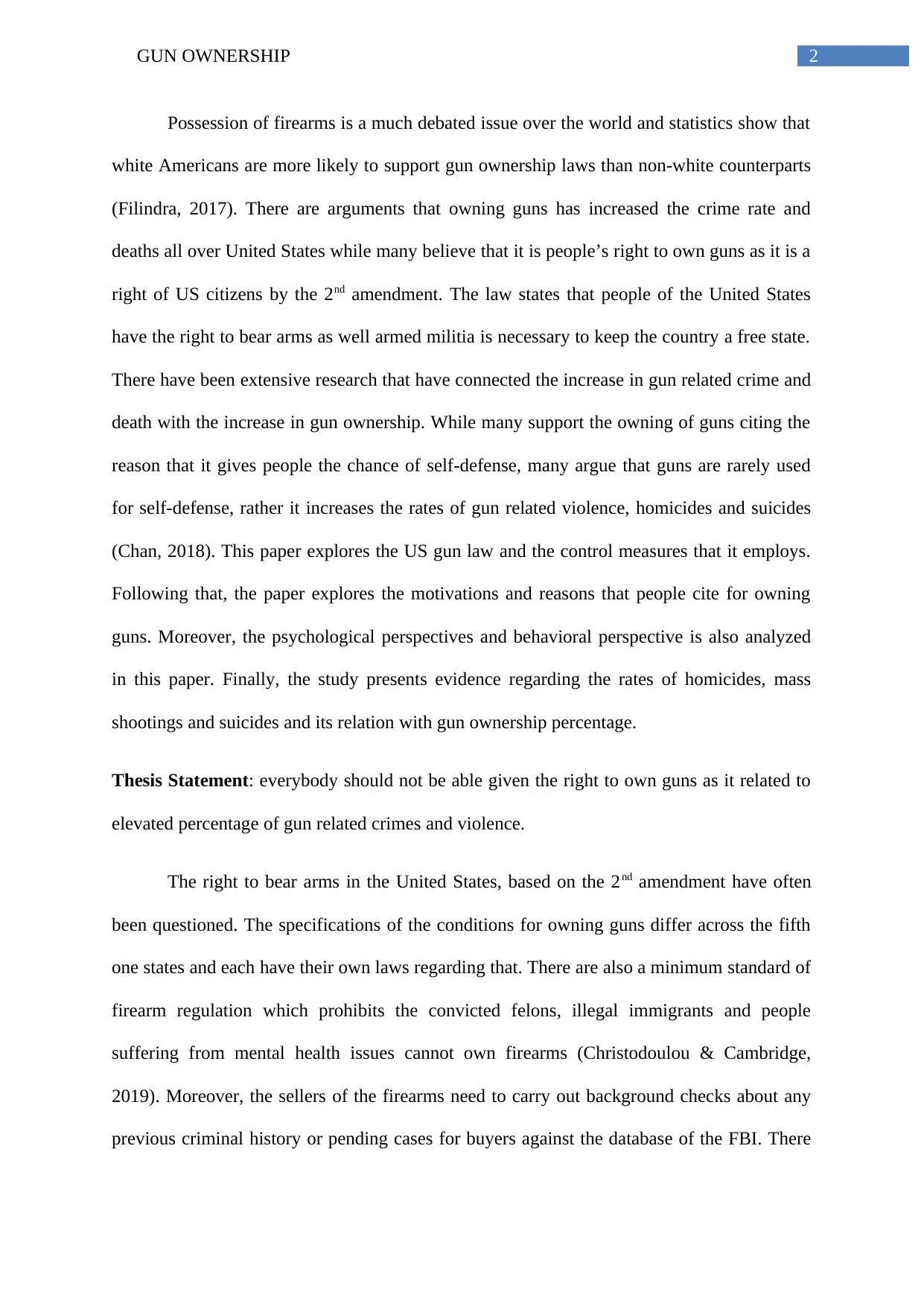
2GUN OWNERSHIP
Possession of firearms is a much debated issue over the world and statistics show that
white Americans are more likely to support gun ownership laws than non-white counterparts
(Filindra, 2017). There are arguments that owning guns has increased the crime rate and
deaths all over United States while many believe that it is people’s right to own guns as it is a
right of US citizens by the 2nd amendment. The law states that people of the United States
have the right to bear arms as well armed militia is necessary to keep the country a free state.
There have been extensive research that have connected the increase in gun related crime and
death with the increase in gun ownership. While many support the owning of guns citing the
reason that it gives people the chance of self-defense, many argue that guns are rarely used
for self-defense, rather it increases the rates of gun related violence, homicides and suicides
(Chan, 2018). This paper explores the US gun law and the control measures that it employs.
Following that, the paper explores the motivations and reasons that people cite for owning
guns. Moreover, the psychological perspectives and behavioral perspective is also analyzed
in this paper. Finally, the study presents evidence regarding the rates of homicides, mass
shootings and suicides and its relation with gun ownership percentage.
Thesis Statement: everybody should not be able given the right to own guns as it related to
elevated percentage of gun related crimes and violence.
The right to bear arms in the United States, based on the 2nd amendment have often
been questioned. The specifications of the conditions for owning guns differ across the fifth
one states and each have their own laws regarding that. There are also a minimum standard of
firearm regulation which prohibits the convicted felons, illegal immigrants and people
suffering from mental health issues cannot own firearms (Christodoulou & Cambridge,
2019). Moreover, the sellers of the firearms need to carry out background checks about any
previous criminal history or pending cases for buyers against the database of the FBI. There
Possession of firearms is a much debated issue over the world and statistics show that
white Americans are more likely to support gun ownership laws than non-white counterparts
(Filindra, 2017). There are arguments that owning guns has increased the crime rate and
deaths all over United States while many believe that it is people’s right to own guns as it is a
right of US citizens by the 2nd amendment. The law states that people of the United States
have the right to bear arms as well armed militia is necessary to keep the country a free state.
There have been extensive research that have connected the increase in gun related crime and
death with the increase in gun ownership. While many support the owning of guns citing the
reason that it gives people the chance of self-defense, many argue that guns are rarely used
for self-defense, rather it increases the rates of gun related violence, homicides and suicides
(Chan, 2018). This paper explores the US gun law and the control measures that it employs.
Following that, the paper explores the motivations and reasons that people cite for owning
guns. Moreover, the psychological perspectives and behavioral perspective is also analyzed
in this paper. Finally, the study presents evidence regarding the rates of homicides, mass
shootings and suicides and its relation with gun ownership percentage.
Thesis Statement: everybody should not be able given the right to own guns as it related to
elevated percentage of gun related crimes and violence.
The right to bear arms in the United States, based on the 2nd amendment have often
been questioned. The specifications of the conditions for owning guns differ across the fifth
one states and each have their own laws regarding that. There are also a minimum standard of
firearm regulation which prohibits the convicted felons, illegal immigrants and people
suffering from mental health issues cannot own firearms (Christodoulou & Cambridge,
2019). Moreover, the sellers of the firearms need to carry out background checks about any
previous criminal history or pending cases for buyers against the database of the FBI. There
⊘ This is a preview!⊘
Do you want full access?
Subscribe today to unlock all pages.

Trusted by 1+ million students worldwide
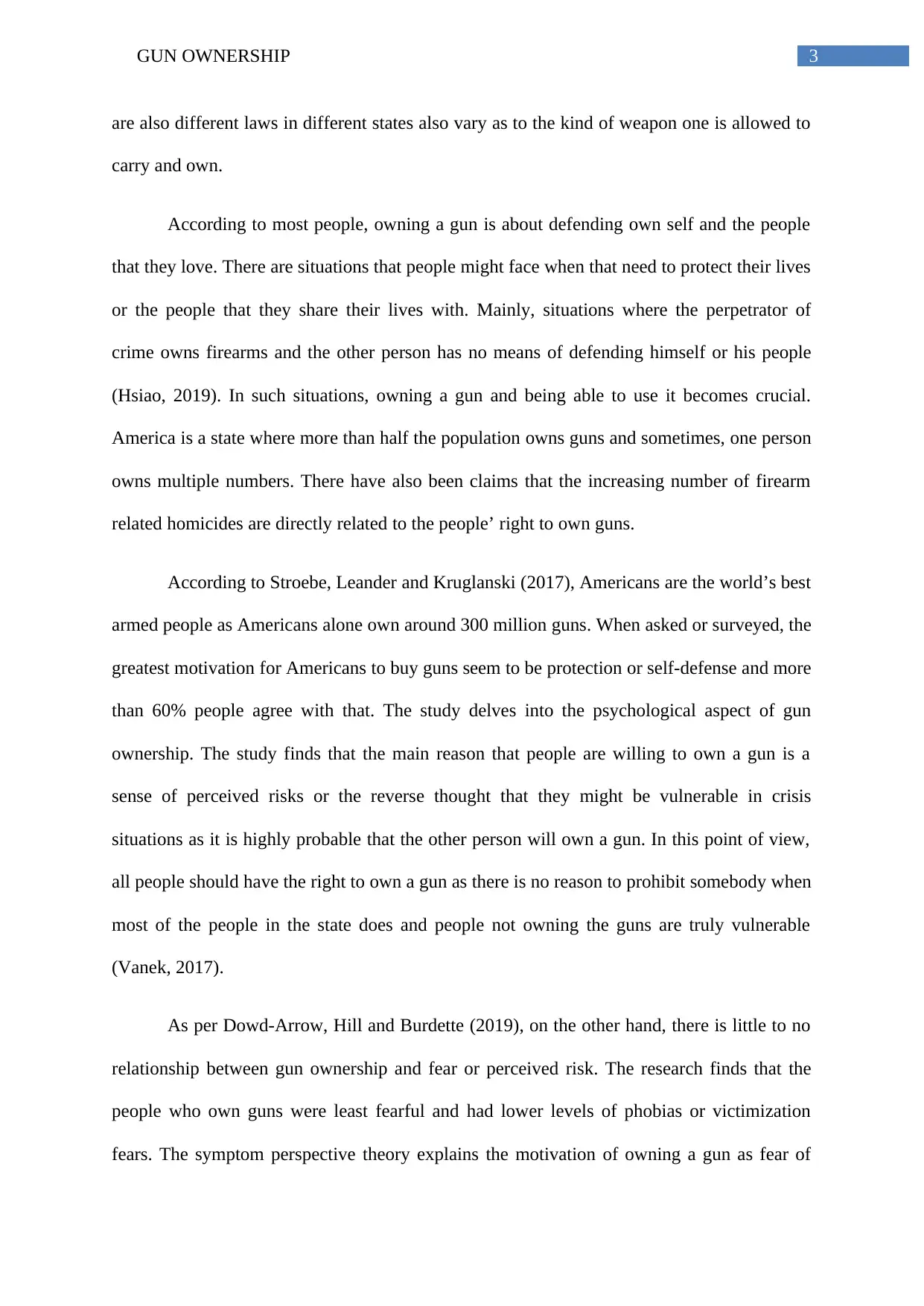
3GUN OWNERSHIP
are also different laws in different states also vary as to the kind of weapon one is allowed to
carry and own.
According to most people, owning a gun is about defending own self and the people
that they love. There are situations that people might face when that need to protect their lives
or the people that they share their lives with. Mainly, situations where the perpetrator of
crime owns firearms and the other person has no means of defending himself or his people
(Hsiao, 2019). In such situations, owning a gun and being able to use it becomes crucial.
America is a state where more than half the population owns guns and sometimes, one person
owns multiple numbers. There have also been claims that the increasing number of firearm
related homicides are directly related to the people’ right to own guns.
According to Stroebe, Leander and Kruglanski (2017), Americans are the world’s best
armed people as Americans alone own around 300 million guns. When asked or surveyed, the
greatest motivation for Americans to buy guns seem to be protection or self-defense and more
than 60% people agree with that. The study delves into the psychological aspect of gun
ownership. The study finds that the main reason that people are willing to own a gun is a
sense of perceived risks or the reverse thought that they might be vulnerable in crisis
situations as it is highly probable that the other person will own a gun. In this point of view,
all people should have the right to own a gun as there is no reason to prohibit somebody when
most of the people in the state does and people not owning the guns are truly vulnerable
(Vanek, 2017).
As per Dowd-Arrow, Hill and Burdette (2019), on the other hand, there is little to no
relationship between gun ownership and fear or perceived risk. The research finds that the
people who own guns were least fearful and had lower levels of phobias or victimization
fears. The symptom perspective theory explains the motivation of owning a gun as fear of
are also different laws in different states also vary as to the kind of weapon one is allowed to
carry and own.
According to most people, owning a gun is about defending own self and the people
that they love. There are situations that people might face when that need to protect their lives
or the people that they share their lives with. Mainly, situations where the perpetrator of
crime owns firearms and the other person has no means of defending himself or his people
(Hsiao, 2019). In such situations, owning a gun and being able to use it becomes crucial.
America is a state where more than half the population owns guns and sometimes, one person
owns multiple numbers. There have also been claims that the increasing number of firearm
related homicides are directly related to the people’ right to own guns.
According to Stroebe, Leander and Kruglanski (2017), Americans are the world’s best
armed people as Americans alone own around 300 million guns. When asked or surveyed, the
greatest motivation for Americans to buy guns seem to be protection or self-defense and more
than 60% people agree with that. The study delves into the psychological aspect of gun
ownership. The study finds that the main reason that people are willing to own a gun is a
sense of perceived risks or the reverse thought that they might be vulnerable in crisis
situations as it is highly probable that the other person will own a gun. In this point of view,
all people should have the right to own a gun as there is no reason to prohibit somebody when
most of the people in the state does and people not owning the guns are truly vulnerable
(Vanek, 2017).
As per Dowd-Arrow, Hill and Burdette (2019), on the other hand, there is little to no
relationship between gun ownership and fear or perceived risk. The research finds that the
people who own guns were least fearful and had lower levels of phobias or victimization
fears. The symptom perspective theory explains the motivation of owning a gun as fear of
Paraphrase This Document
Need a fresh take? Get an instant paraphrase of this document with our AI Paraphraser
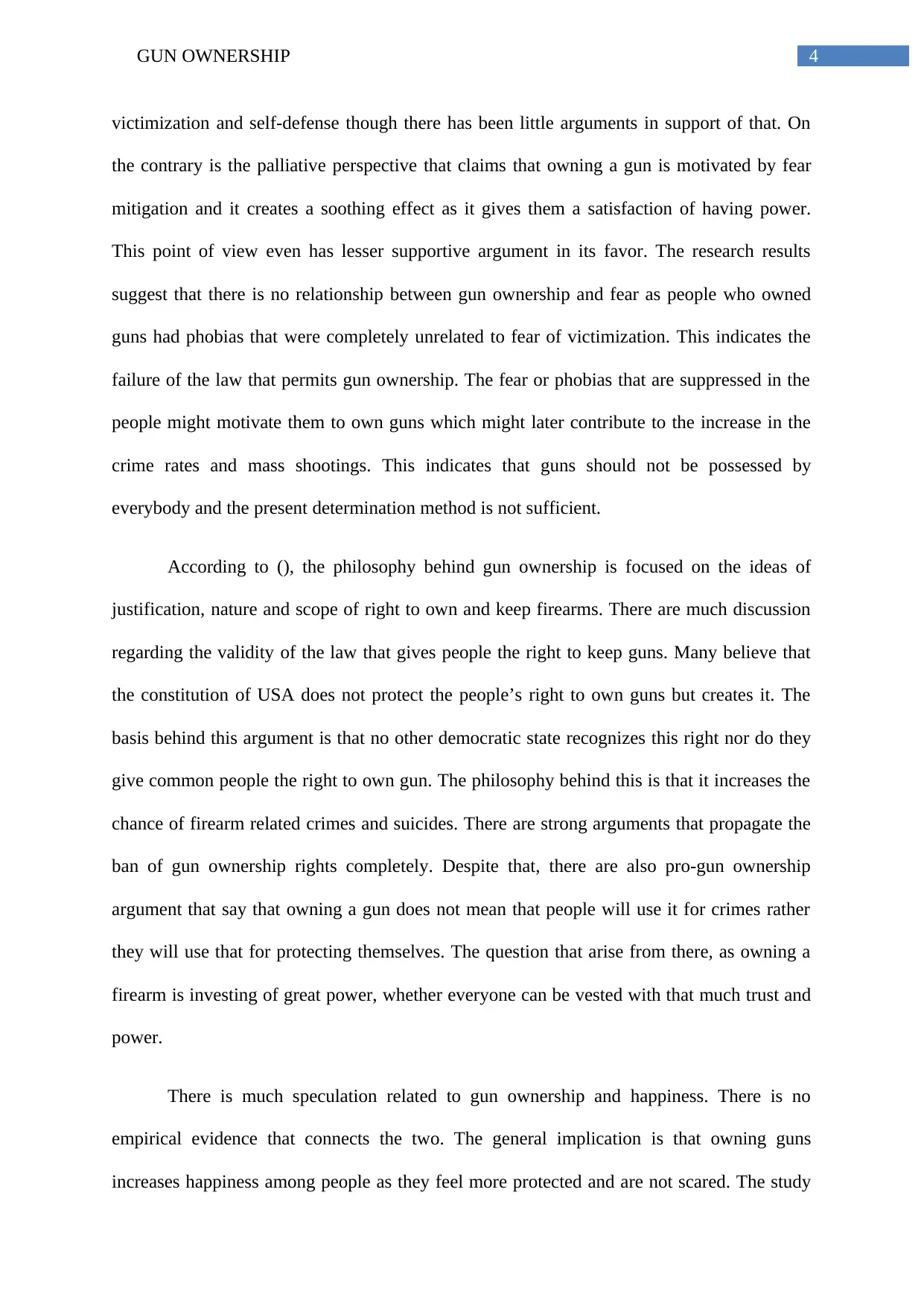
4GUN OWNERSHIP
victimization and self-defense though there has been little arguments in support of that. On
the contrary is the palliative perspective that claims that owning a gun is motivated by fear
mitigation and it creates a soothing effect as it gives them a satisfaction of having power.
This point of view even has lesser supportive argument in its favor. The research results
suggest that there is no relationship between gun ownership and fear as people who owned
guns had phobias that were completely unrelated to fear of victimization. This indicates the
failure of the law that permits gun ownership. The fear or phobias that are suppressed in the
people might motivate them to own guns which might later contribute to the increase in the
crime rates and mass shootings. This indicates that guns should not be possessed by
everybody and the present determination method is not sufficient.
According to (), the philosophy behind gun ownership is focused on the ideas of
justification, nature and scope of right to own and keep firearms. There are much discussion
regarding the validity of the law that gives people the right to keep guns. Many believe that
the constitution of USA does not protect the people’s right to own guns but creates it. The
basis behind this argument is that no other democratic state recognizes this right nor do they
give common people the right to own gun. The philosophy behind this is that it increases the
chance of firearm related crimes and suicides. There are strong arguments that propagate the
ban of gun ownership rights completely. Despite that, there are also pro-gun ownership
argument that say that owning a gun does not mean that people will use it for crimes rather
they will use that for protecting themselves. The question that arise from there, as owning a
firearm is investing of great power, whether everyone can be vested with that much trust and
power.
There is much speculation related to gun ownership and happiness. There is no
empirical evidence that connects the two. The general implication is that owning guns
increases happiness among people as they feel more protected and are not scared. The study
victimization and self-defense though there has been little arguments in support of that. On
the contrary is the palliative perspective that claims that owning a gun is motivated by fear
mitigation and it creates a soothing effect as it gives them a satisfaction of having power.
This point of view even has lesser supportive argument in its favor. The research results
suggest that there is no relationship between gun ownership and fear as people who owned
guns had phobias that were completely unrelated to fear of victimization. This indicates the
failure of the law that permits gun ownership. The fear or phobias that are suppressed in the
people might motivate them to own guns which might later contribute to the increase in the
crime rates and mass shootings. This indicates that guns should not be possessed by
everybody and the present determination method is not sufficient.
According to (), the philosophy behind gun ownership is focused on the ideas of
justification, nature and scope of right to own and keep firearms. There are much discussion
regarding the validity of the law that gives people the right to keep guns. Many believe that
the constitution of USA does not protect the people’s right to own guns but creates it. The
basis behind this argument is that no other democratic state recognizes this right nor do they
give common people the right to own gun. The philosophy behind this is that it increases the
chance of firearm related crimes and suicides. There are strong arguments that propagate the
ban of gun ownership rights completely. Despite that, there are also pro-gun ownership
argument that say that owning a gun does not mean that people will use it for crimes rather
they will use that for protecting themselves. The question that arise from there, as owning a
firearm is investing of great power, whether everyone can be vested with that much trust and
power.
There is much speculation related to gun ownership and happiness. There is no
empirical evidence that connects the two. The general implication is that owning guns
increases happiness among people as they feel more protected and are not scared. The study
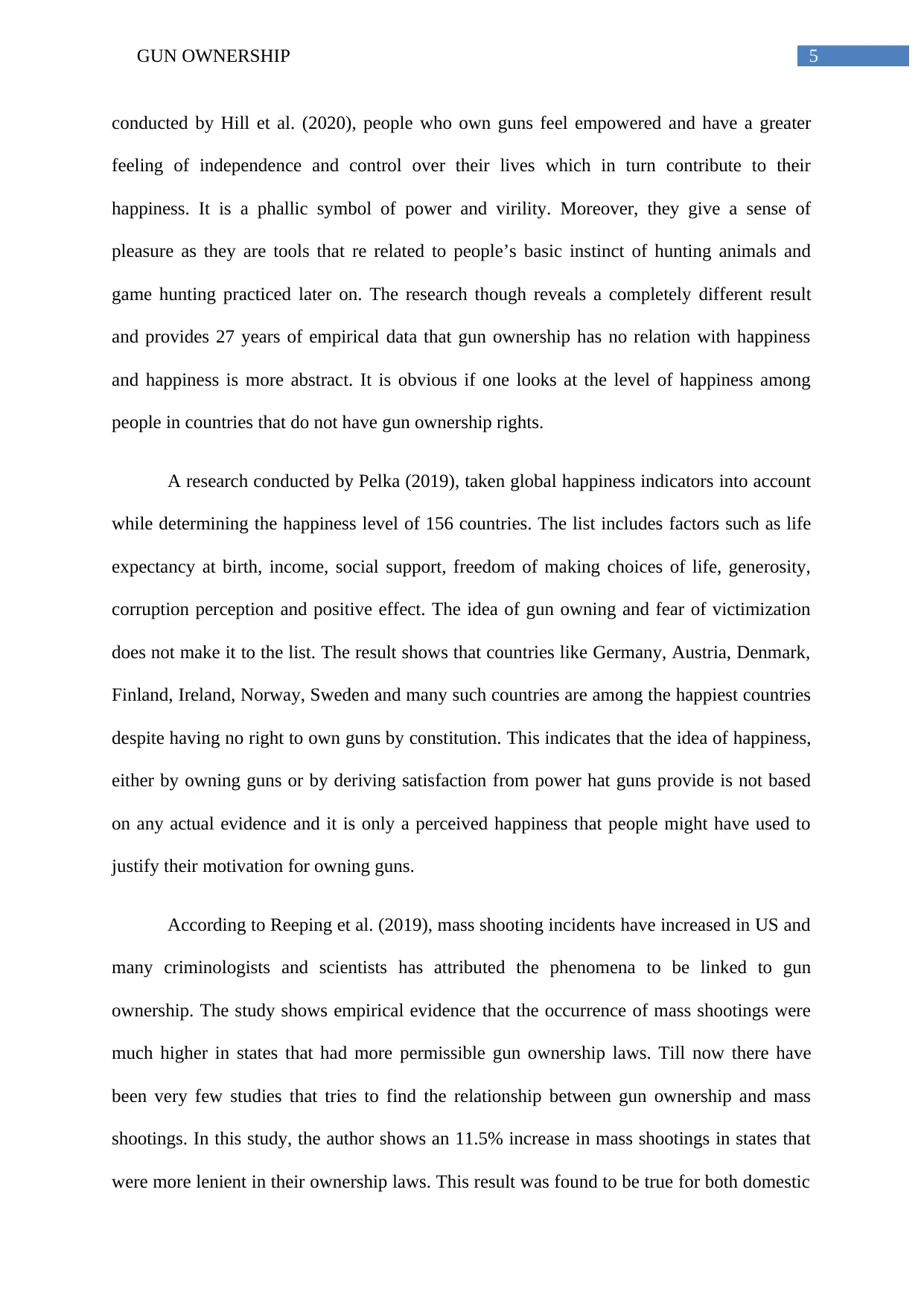
5GUN OWNERSHIP
conducted by Hill et al. (2020), people who own guns feel empowered and have a greater
feeling of independence and control over their lives which in turn contribute to their
happiness. It is a phallic symbol of power and virility. Moreover, they give a sense of
pleasure as they are tools that re related to people’s basic instinct of hunting animals and
game hunting practiced later on. The research though reveals a completely different result
and provides 27 years of empirical data that gun ownership has no relation with happiness
and happiness is more abstract. It is obvious if one looks at the level of happiness among
people in countries that do not have gun ownership rights.
A research conducted by Pelka (2019), taken global happiness indicators into account
while determining the happiness level of 156 countries. The list includes factors such as life
expectancy at birth, income, social support, freedom of making choices of life, generosity,
corruption perception and positive effect. The idea of gun owning and fear of victimization
does not make it to the list. The result shows that countries like Germany, Austria, Denmark,
Finland, Ireland, Norway, Sweden and many such countries are among the happiest countries
despite having no right to own guns by constitution. This indicates that the idea of happiness,
either by owning guns or by deriving satisfaction from power hat guns provide is not based
on any actual evidence and it is only a perceived happiness that people might have used to
justify their motivation for owning guns.
According to Reeping et al. (2019), mass shooting incidents have increased in US and
many criminologists and scientists has attributed the phenomena to be linked to gun
ownership. The study shows empirical evidence that the occurrence of mass shootings were
much higher in states that had more permissible gun ownership laws. Till now there have
been very few studies that tries to find the relationship between gun ownership and mass
shootings. In this study, the author shows an 11.5% increase in mass shootings in states that
were more lenient in their ownership laws. This result was found to be true for both domestic
conducted by Hill et al. (2020), people who own guns feel empowered and have a greater
feeling of independence and control over their lives which in turn contribute to their
happiness. It is a phallic symbol of power and virility. Moreover, they give a sense of
pleasure as they are tools that re related to people’s basic instinct of hunting animals and
game hunting practiced later on. The research though reveals a completely different result
and provides 27 years of empirical data that gun ownership has no relation with happiness
and happiness is more abstract. It is obvious if one looks at the level of happiness among
people in countries that do not have gun ownership rights.
A research conducted by Pelka (2019), taken global happiness indicators into account
while determining the happiness level of 156 countries. The list includes factors such as life
expectancy at birth, income, social support, freedom of making choices of life, generosity,
corruption perception and positive effect. The idea of gun owning and fear of victimization
does not make it to the list. The result shows that countries like Germany, Austria, Denmark,
Finland, Ireland, Norway, Sweden and many such countries are among the happiest countries
despite having no right to own guns by constitution. This indicates that the idea of happiness,
either by owning guns or by deriving satisfaction from power hat guns provide is not based
on any actual evidence and it is only a perceived happiness that people might have used to
justify their motivation for owning guns.
According to Reeping et al. (2019), mass shooting incidents have increased in US and
many criminologists and scientists has attributed the phenomena to be linked to gun
ownership. The study shows empirical evidence that the occurrence of mass shootings were
much higher in states that had more permissible gun ownership laws. Till now there have
been very few studies that tries to find the relationship between gun ownership and mass
shootings. In this study, the author shows an 11.5% increase in mass shootings in states that
were more lenient in their ownership laws. This result was found to be true for both domestic
⊘ This is a preview!⊘
Do you want full access?
Subscribe today to unlock all pages.

Trusted by 1+ million students worldwide
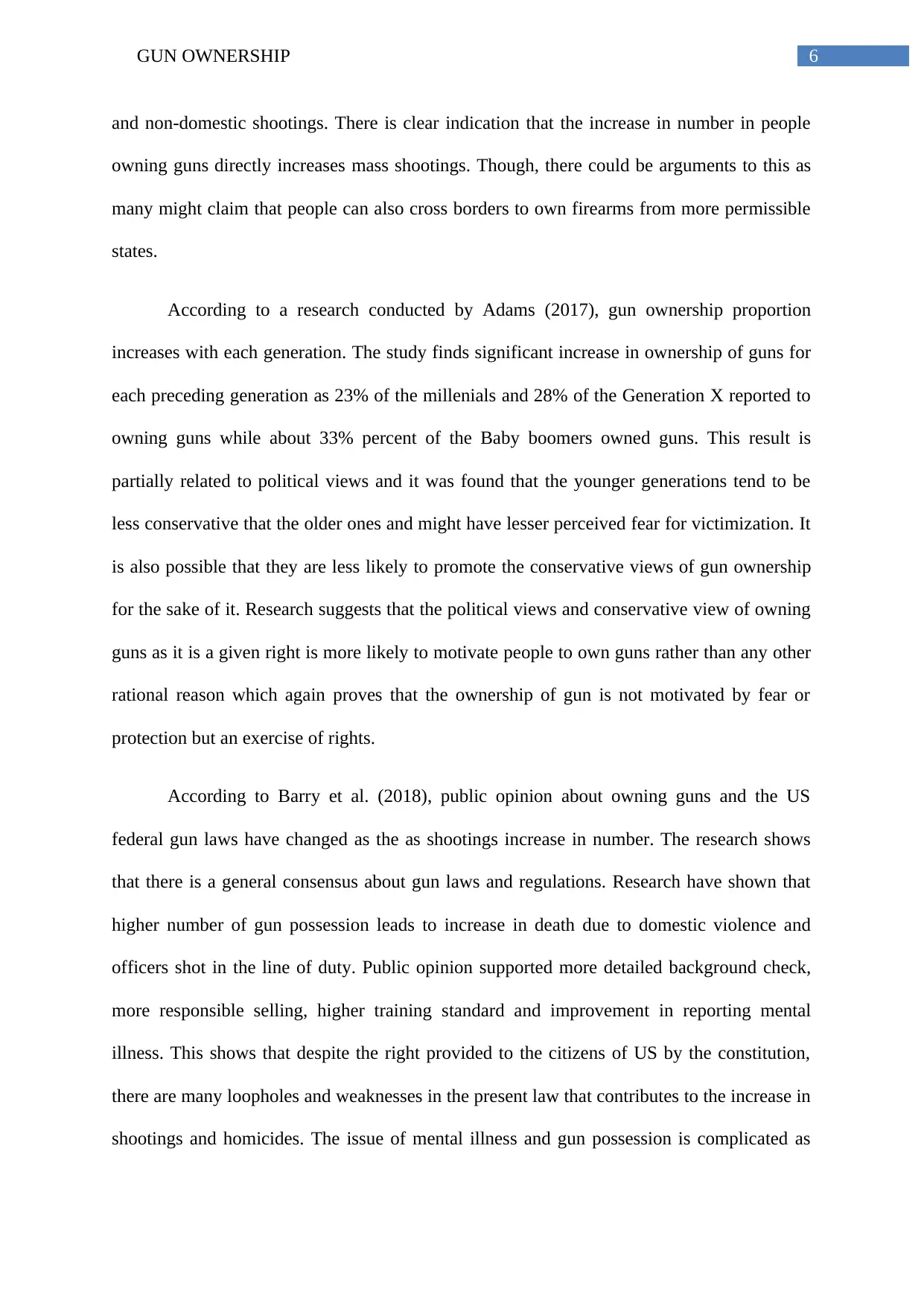
6GUN OWNERSHIP
and non-domestic shootings. There is clear indication that the increase in number in people
owning guns directly increases mass shootings. Though, there could be arguments to this as
many might claim that people can also cross borders to own firearms from more permissible
states.
According to a research conducted by Adams (2017), gun ownership proportion
increases with each generation. The study finds significant increase in ownership of guns for
each preceding generation as 23% of the millenials and 28% of the Generation X reported to
owning guns while about 33% percent of the Baby boomers owned guns. This result is
partially related to political views and it was found that the younger generations tend to be
less conservative that the older ones and might have lesser perceived fear for victimization. It
is also possible that they are less likely to promote the conservative views of gun ownership
for the sake of it. Research suggests that the political views and conservative view of owning
guns as it is a given right is more likely to motivate people to own guns rather than any other
rational reason which again proves that the ownership of gun is not motivated by fear or
protection but an exercise of rights.
According to Barry et al. (2018), public opinion about owning guns and the US
federal gun laws have changed as the as shootings increase in number. The research shows
that there is a general consensus about gun laws and regulations. Research have shown that
higher number of gun possession leads to increase in death due to domestic violence and
officers shot in the line of duty. Public opinion supported more detailed background check,
more responsible selling, higher training standard and improvement in reporting mental
illness. This shows that despite the right provided to the citizens of US by the constitution,
there are many loopholes and weaknesses in the present law that contributes to the increase in
shootings and homicides. The issue of mental illness and gun possession is complicated as
and non-domestic shootings. There is clear indication that the increase in number in people
owning guns directly increases mass shootings. Though, there could be arguments to this as
many might claim that people can also cross borders to own firearms from more permissible
states.
According to a research conducted by Adams (2017), gun ownership proportion
increases with each generation. The study finds significant increase in ownership of guns for
each preceding generation as 23% of the millenials and 28% of the Generation X reported to
owning guns while about 33% percent of the Baby boomers owned guns. This result is
partially related to political views and it was found that the younger generations tend to be
less conservative that the older ones and might have lesser perceived fear for victimization. It
is also possible that they are less likely to promote the conservative views of gun ownership
for the sake of it. Research suggests that the political views and conservative view of owning
guns as it is a given right is more likely to motivate people to own guns rather than any other
rational reason which again proves that the ownership of gun is not motivated by fear or
protection but an exercise of rights.
According to Barry et al. (2018), public opinion about owning guns and the US
federal gun laws have changed as the as shootings increase in number. The research shows
that there is a general consensus about gun laws and regulations. Research have shown that
higher number of gun possession leads to increase in death due to domestic violence and
officers shot in the line of duty. Public opinion supported more detailed background check,
more responsible selling, higher training standard and improvement in reporting mental
illness. This shows that despite the right provided to the citizens of US by the constitution,
there are many loopholes and weaknesses in the present law that contributes to the increase in
shootings and homicides. The issue of mental illness and gun possession is complicated as
Paraphrase This Document
Need a fresh take? Get an instant paraphrase of this document with our AI Paraphraser
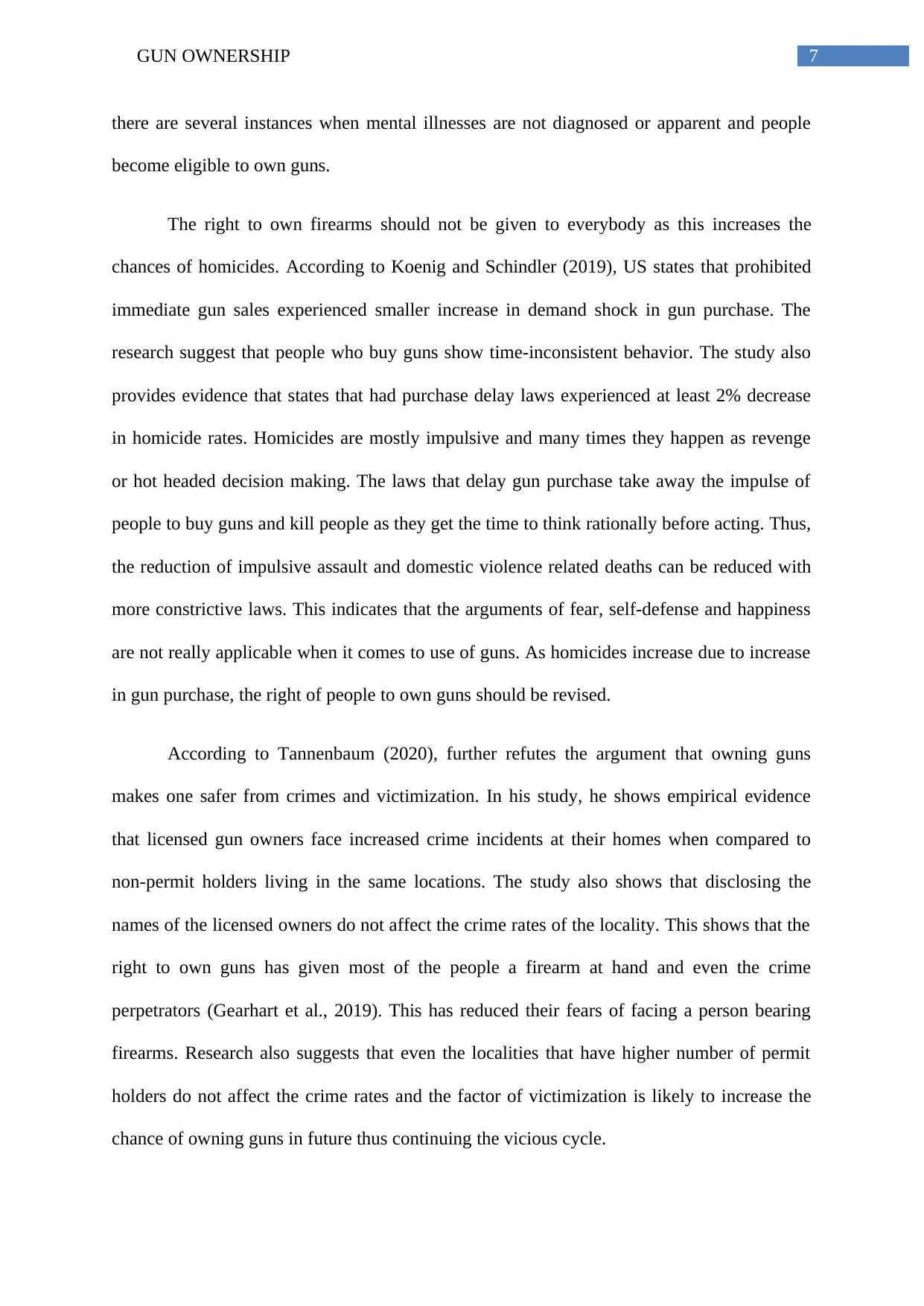
7GUN OWNERSHIP
there are several instances when mental illnesses are not diagnosed or apparent and people
become eligible to own guns.
The right to own firearms should not be given to everybody as this increases the
chances of homicides. According to Koenig and Schindler (2019), US states that prohibited
immediate gun sales experienced smaller increase in demand shock in gun purchase. The
research suggest that people who buy guns show time-inconsistent behavior. The study also
provides evidence that states that had purchase delay laws experienced at least 2% decrease
in homicide rates. Homicides are mostly impulsive and many times they happen as revenge
or hot headed decision making. The laws that delay gun purchase take away the impulse of
people to buy guns and kill people as they get the time to think rationally before acting. Thus,
the reduction of impulsive assault and domestic violence related deaths can be reduced with
more constrictive laws. This indicates that the arguments of fear, self-defense and happiness
are not really applicable when it comes to use of guns. As homicides increase due to increase
in gun purchase, the right of people to own guns should be revised.
According to Tannenbaum (2020), further refutes the argument that owning guns
makes one safer from crimes and victimization. In his study, he shows empirical evidence
that licensed gun owners face increased crime incidents at their homes when compared to
non-permit holders living in the same locations. The study also shows that disclosing the
names of the licensed owners do not affect the crime rates of the locality. This shows that the
right to own guns has given most of the people a firearm at hand and even the crime
perpetrators (Gearhart et al., 2019). This has reduced their fears of facing a person bearing
firearms. Research also suggests that even the localities that have higher number of permit
holders do not affect the crime rates and the factor of victimization is likely to increase the
chance of owning guns in future thus continuing the vicious cycle.
there are several instances when mental illnesses are not diagnosed or apparent and people
become eligible to own guns.
The right to own firearms should not be given to everybody as this increases the
chances of homicides. According to Koenig and Schindler (2019), US states that prohibited
immediate gun sales experienced smaller increase in demand shock in gun purchase. The
research suggest that people who buy guns show time-inconsistent behavior. The study also
provides evidence that states that had purchase delay laws experienced at least 2% decrease
in homicide rates. Homicides are mostly impulsive and many times they happen as revenge
or hot headed decision making. The laws that delay gun purchase take away the impulse of
people to buy guns and kill people as they get the time to think rationally before acting. Thus,
the reduction of impulsive assault and domestic violence related deaths can be reduced with
more constrictive laws. This indicates that the arguments of fear, self-defense and happiness
are not really applicable when it comes to use of guns. As homicides increase due to increase
in gun purchase, the right of people to own guns should be revised.
According to Tannenbaum (2020), further refutes the argument that owning guns
makes one safer from crimes and victimization. In his study, he shows empirical evidence
that licensed gun owners face increased crime incidents at their homes when compared to
non-permit holders living in the same locations. The study also shows that disclosing the
names of the licensed owners do not affect the crime rates of the locality. This shows that the
right to own guns has given most of the people a firearm at hand and even the crime
perpetrators (Gearhart et al., 2019). This has reduced their fears of facing a person bearing
firearms. Research also suggests that even the localities that have higher number of permit
holders do not affect the crime rates and the factor of victimization is likely to increase the
chance of owning guns in future thus continuing the vicious cycle.
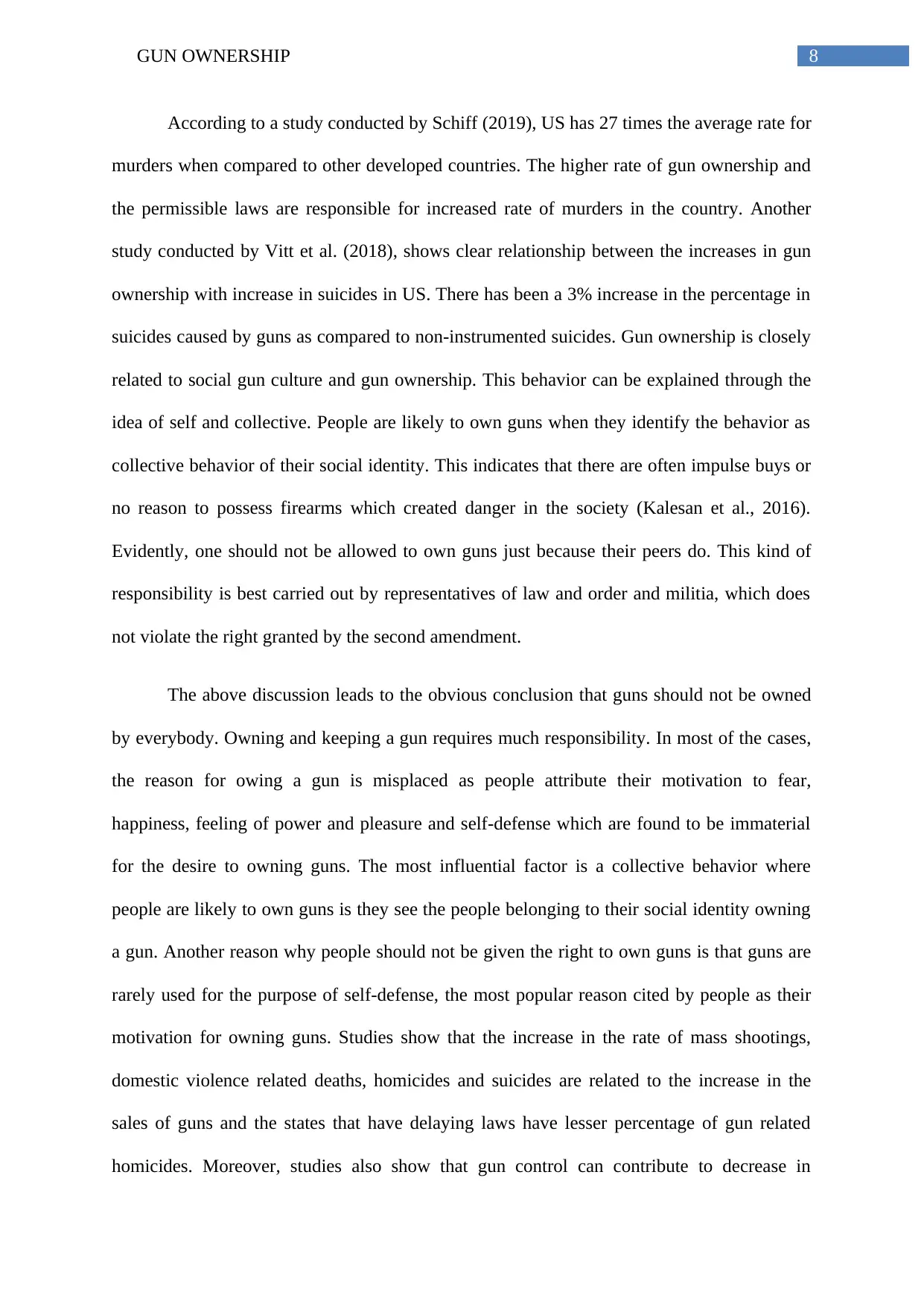
8GUN OWNERSHIP
According to a study conducted by Schiff (2019), US has 27 times the average rate for
murders when compared to other developed countries. The higher rate of gun ownership and
the permissible laws are responsible for increased rate of murders in the country. Another
study conducted by Vitt et al. (2018), shows clear relationship between the increases in gun
ownership with increase in suicides in US. There has been a 3% increase in the percentage in
suicides caused by guns as compared to non-instrumented suicides. Gun ownership is closely
related to social gun culture and gun ownership. This behavior can be explained through the
idea of self and collective. People are likely to own guns when they identify the behavior as
collective behavior of their social identity. This indicates that there are often impulse buys or
no reason to possess firearms which created danger in the society (Kalesan et al., 2016).
Evidently, one should not be allowed to own guns just because their peers do. This kind of
responsibility is best carried out by representatives of law and order and militia, which does
not violate the right granted by the second amendment.
The above discussion leads to the obvious conclusion that guns should not be owned
by everybody. Owning and keeping a gun requires much responsibility. In most of the cases,
the reason for owing a gun is misplaced as people attribute their motivation to fear,
happiness, feeling of power and pleasure and self-defense which are found to be immaterial
for the desire to owning guns. The most influential factor is a collective behavior where
people are likely to own guns is they see the people belonging to their social identity owning
a gun. Another reason why people should not be given the right to own guns is that guns are
rarely used for the purpose of self-defense, the most popular reason cited by people as their
motivation for owning guns. Studies show that the increase in the rate of mass shootings,
domestic violence related deaths, homicides and suicides are related to the increase in the
sales of guns and the states that have delaying laws have lesser percentage of gun related
homicides. Moreover, studies also show that gun control can contribute to decrease in
According to a study conducted by Schiff (2019), US has 27 times the average rate for
murders when compared to other developed countries. The higher rate of gun ownership and
the permissible laws are responsible for increased rate of murders in the country. Another
study conducted by Vitt et al. (2018), shows clear relationship between the increases in gun
ownership with increase in suicides in US. There has been a 3% increase in the percentage in
suicides caused by guns as compared to non-instrumented suicides. Gun ownership is closely
related to social gun culture and gun ownership. This behavior can be explained through the
idea of self and collective. People are likely to own guns when they identify the behavior as
collective behavior of their social identity. This indicates that there are often impulse buys or
no reason to possess firearms which created danger in the society (Kalesan et al., 2016).
Evidently, one should not be allowed to own guns just because their peers do. This kind of
responsibility is best carried out by representatives of law and order and militia, which does
not violate the right granted by the second amendment.
The above discussion leads to the obvious conclusion that guns should not be owned
by everybody. Owning and keeping a gun requires much responsibility. In most of the cases,
the reason for owing a gun is misplaced as people attribute their motivation to fear,
happiness, feeling of power and pleasure and self-defense which are found to be immaterial
for the desire to owning guns. The most influential factor is a collective behavior where
people are likely to own guns is they see the people belonging to their social identity owning
a gun. Another reason why people should not be given the right to own guns is that guns are
rarely used for the purpose of self-defense, the most popular reason cited by people as their
motivation for owning guns. Studies show that the increase in the rate of mass shootings,
domestic violence related deaths, homicides and suicides are related to the increase in the
sales of guns and the states that have delaying laws have lesser percentage of gun related
homicides. Moreover, studies also show that gun control can contribute to decrease in
⊘ This is a preview!⊘
Do you want full access?
Subscribe today to unlock all pages.

Trusted by 1+ million students worldwide
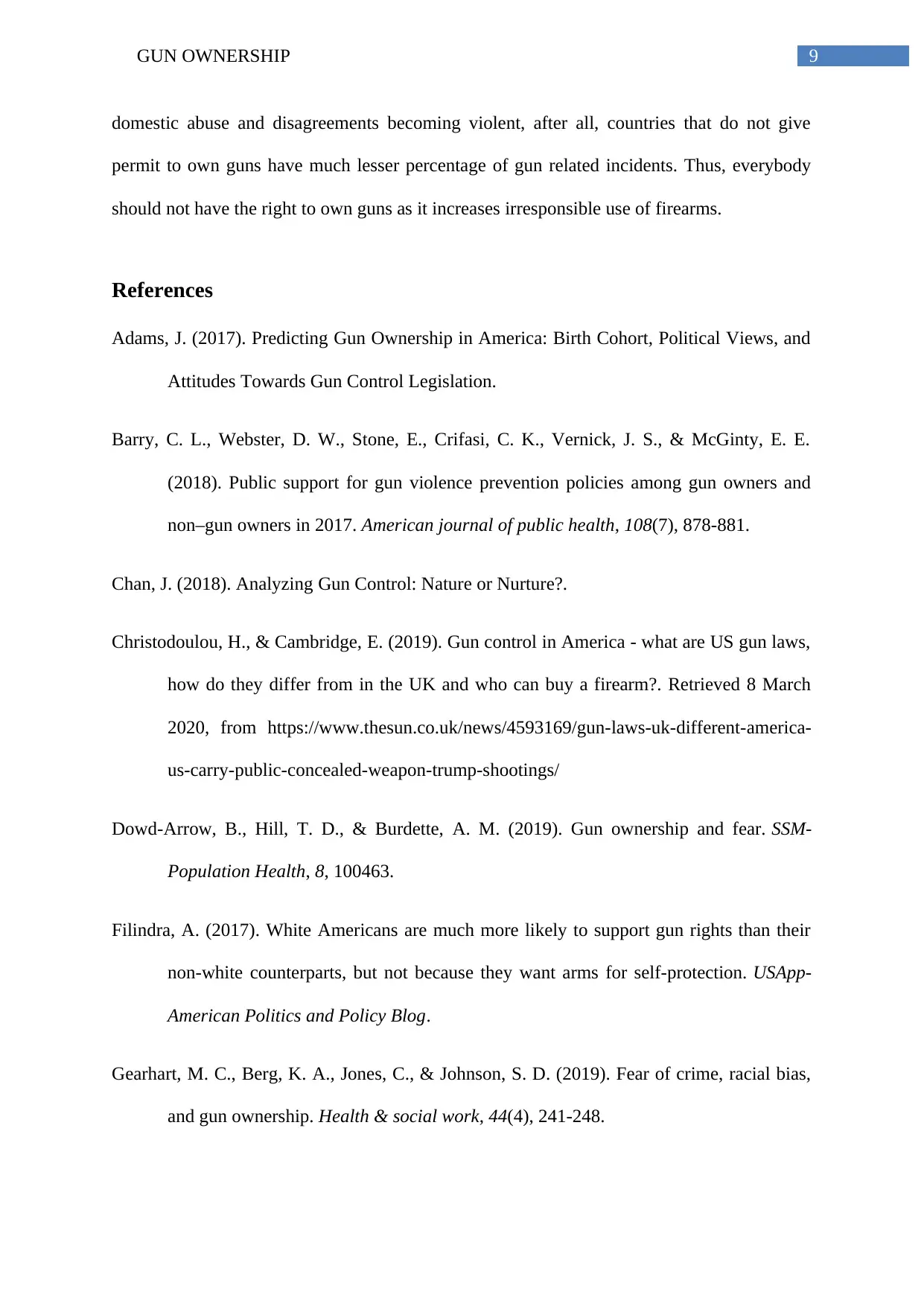
9GUN OWNERSHIP
domestic abuse and disagreements becoming violent, after all, countries that do not give
permit to own guns have much lesser percentage of gun related incidents. Thus, everybody
should not have the right to own guns as it increases irresponsible use of firearms.
References
Adams, J. (2017). Predicting Gun Ownership in America: Birth Cohort, Political Views, and
Attitudes Towards Gun Control Legislation.
Barry, C. L., Webster, D. W., Stone, E., Crifasi, C. K., Vernick, J. S., & McGinty, E. E.
(2018). Public support for gun violence prevention policies among gun owners and
non–gun owners in 2017. American journal of public health, 108(7), 878-881.
Chan, J. (2018). Analyzing Gun Control: Nature or Nurture?.
Christodoulou, H., & Cambridge, E. (2019). Gun control in America - what are US gun laws,
how do they differ from in the UK and who can buy a firearm?. Retrieved 8 March
2020, from https://www.thesun.co.uk/news/4593169/gun-laws-uk-different-america-
us-carry-public-concealed-weapon-trump-shootings/
Dowd-Arrow, B., Hill, T. D., & Burdette, A. M. (2019). Gun ownership and fear. SSM-
Population Health, 8, 100463.
Filindra, A. (2017). White Americans are much more likely to support gun rights than their
non-white counterparts, but not because they want arms for self-protection. USApp-
American Politics and Policy Blog.
Gearhart, M. C., Berg, K. A., Jones, C., & Johnson, S. D. (2019). Fear of crime, racial bias,
and gun ownership. Health & social work, 44(4), 241-248.
domestic abuse and disagreements becoming violent, after all, countries that do not give
permit to own guns have much lesser percentage of gun related incidents. Thus, everybody
should not have the right to own guns as it increases irresponsible use of firearms.
References
Adams, J. (2017). Predicting Gun Ownership in America: Birth Cohort, Political Views, and
Attitudes Towards Gun Control Legislation.
Barry, C. L., Webster, D. W., Stone, E., Crifasi, C. K., Vernick, J. S., & McGinty, E. E.
(2018). Public support for gun violence prevention policies among gun owners and
non–gun owners in 2017. American journal of public health, 108(7), 878-881.
Chan, J. (2018). Analyzing Gun Control: Nature or Nurture?.
Christodoulou, H., & Cambridge, E. (2019). Gun control in America - what are US gun laws,
how do they differ from in the UK and who can buy a firearm?. Retrieved 8 March
2020, from https://www.thesun.co.uk/news/4593169/gun-laws-uk-different-america-
us-carry-public-concealed-weapon-trump-shootings/
Dowd-Arrow, B., Hill, T. D., & Burdette, A. M. (2019). Gun ownership and fear. SSM-
Population Health, 8, 100463.
Filindra, A. (2017). White Americans are much more likely to support gun rights than their
non-white counterparts, but not because they want arms for self-protection. USApp-
American Politics and Policy Blog.
Gearhart, M. C., Berg, K. A., Jones, C., & Johnson, S. D. (2019). Fear of crime, racial bias,
and gun ownership. Health & social work, 44(4), 241-248.
Paraphrase This Document
Need a fresh take? Get an instant paraphrase of this document with our AI Paraphraser
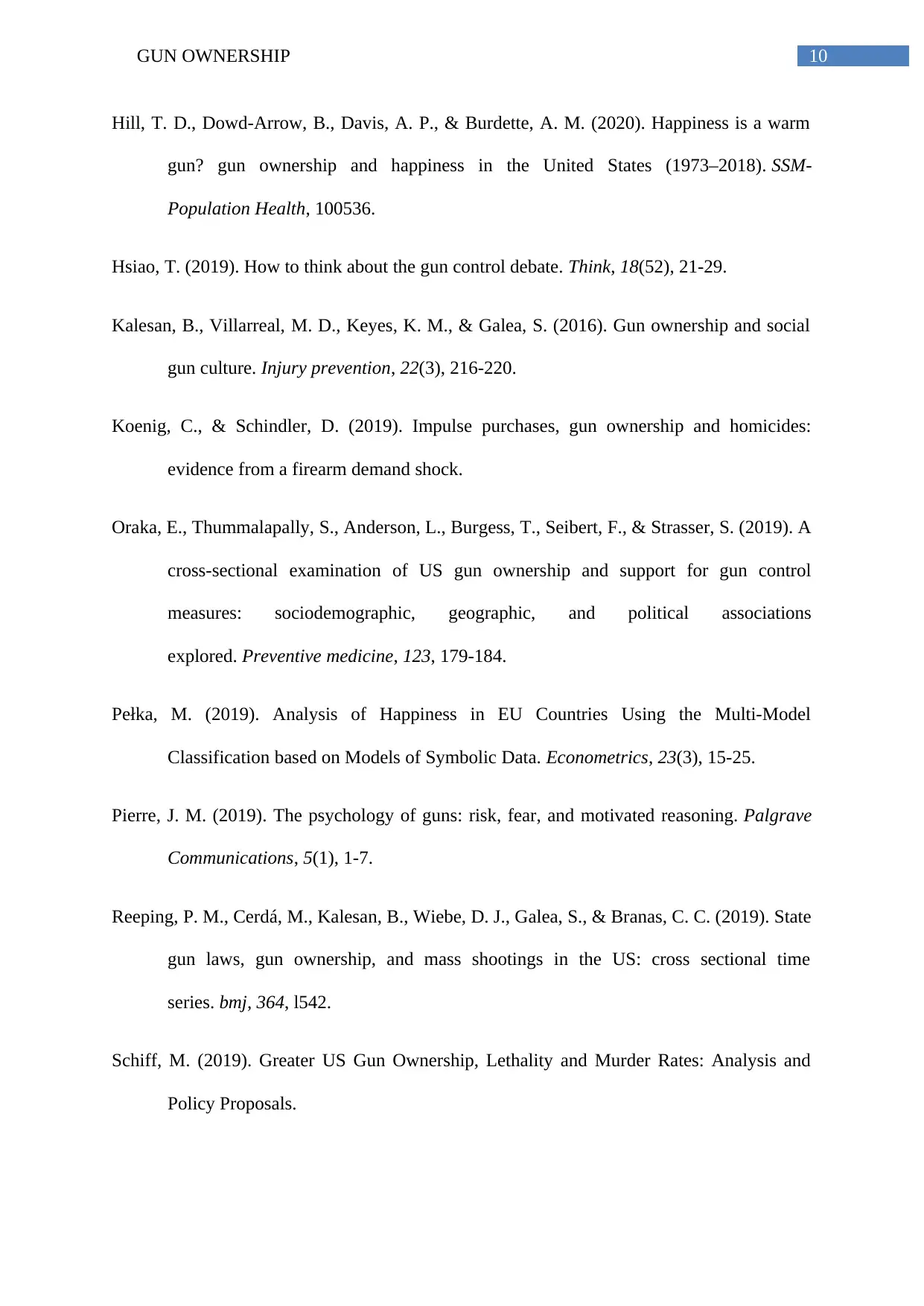
10GUN OWNERSHIP
Hill, T. D., Dowd-Arrow, B., Davis, A. P., & Burdette, A. M. (2020). Happiness is a warm
gun? gun ownership and happiness in the United States (1973–2018). SSM-
Population Health, 100536.
Hsiao, T. (2019). How to think about the gun control debate. Think, 18(52), 21-29.
Kalesan, B., Villarreal, M. D., Keyes, K. M., & Galea, S. (2016). Gun ownership and social
gun culture. Injury prevention, 22(3), 216-220.
Koenig, C., & Schindler, D. (2019). Impulse purchases, gun ownership and homicides:
evidence from a firearm demand shock.
Oraka, E., Thummalapally, S., Anderson, L., Burgess, T., Seibert, F., & Strasser, S. (2019). A
cross-sectional examination of US gun ownership and support for gun control
measures: sociodemographic, geographic, and political associations
explored. Preventive medicine, 123, 179-184.
Pełka, M. (2019). Analysis of Happiness in EU Countries Using the Multi-Model
Classification based on Models of Symbolic Data. Econometrics, 23(3), 15-25.
Pierre, J. M. (2019). The psychology of guns: risk, fear, and motivated reasoning. Palgrave
Communications, 5(1), 1-7.
Reeping, P. M., Cerdá, M., Kalesan, B., Wiebe, D. J., Galea, S., & Branas, C. C. (2019). State
gun laws, gun ownership, and mass shootings in the US: cross sectional time
series. bmj, 364, l542.
Schiff, M. (2019). Greater US Gun Ownership, Lethality and Murder Rates: Analysis and
Policy Proposals.
Hill, T. D., Dowd-Arrow, B., Davis, A. P., & Burdette, A. M. (2020). Happiness is a warm
gun? gun ownership and happiness in the United States (1973–2018). SSM-
Population Health, 100536.
Hsiao, T. (2019). How to think about the gun control debate. Think, 18(52), 21-29.
Kalesan, B., Villarreal, M. D., Keyes, K. M., & Galea, S. (2016). Gun ownership and social
gun culture. Injury prevention, 22(3), 216-220.
Koenig, C., & Schindler, D. (2019). Impulse purchases, gun ownership and homicides:
evidence from a firearm demand shock.
Oraka, E., Thummalapally, S., Anderson, L., Burgess, T., Seibert, F., & Strasser, S. (2019). A
cross-sectional examination of US gun ownership and support for gun control
measures: sociodemographic, geographic, and political associations
explored. Preventive medicine, 123, 179-184.
Pełka, M. (2019). Analysis of Happiness in EU Countries Using the Multi-Model
Classification based on Models of Symbolic Data. Econometrics, 23(3), 15-25.
Pierre, J. M. (2019). The psychology of guns: risk, fear, and motivated reasoning. Palgrave
Communications, 5(1), 1-7.
Reeping, P. M., Cerdá, M., Kalesan, B., Wiebe, D. J., Galea, S., & Branas, C. C. (2019). State
gun laws, gun ownership, and mass shootings in the US: cross sectional time
series. bmj, 364, l542.
Schiff, M. (2019). Greater US Gun Ownership, Lethality and Murder Rates: Analysis and
Policy Proposals.
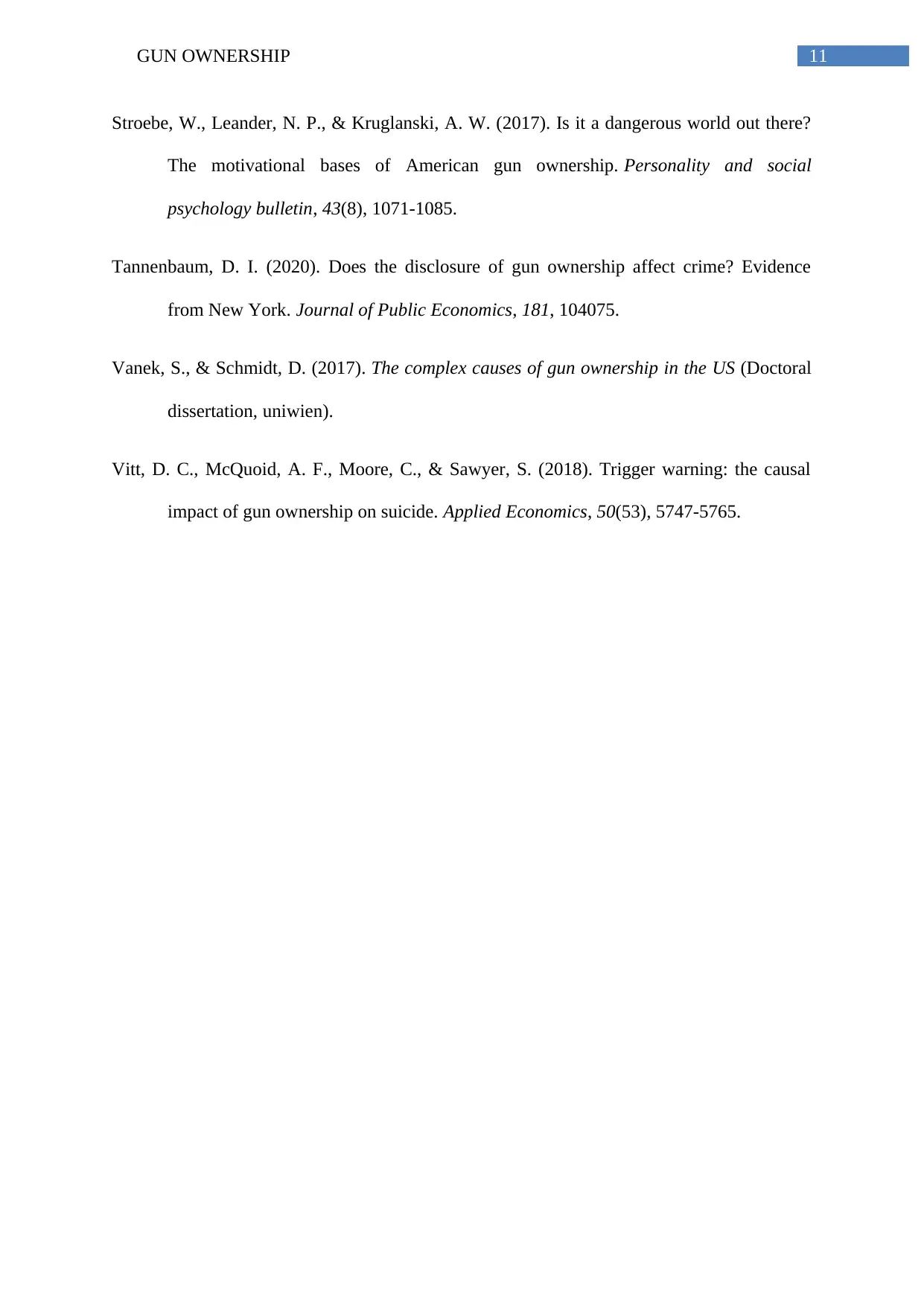
11GUN OWNERSHIP
Stroebe, W., Leander, N. P., & Kruglanski, A. W. (2017). Is it a dangerous world out there?
The motivational bases of American gun ownership. Personality and social
psychology bulletin, 43(8), 1071-1085.
Tannenbaum, D. I. (2020). Does the disclosure of gun ownership affect crime? Evidence
from New York. Journal of Public Economics, 181, 104075.
Vanek, S., & Schmidt, D. (2017). The complex causes of gun ownership in the US (Doctoral
dissertation, uniwien).
Vitt, D. C., McQuoid, A. F., Moore, C., & Sawyer, S. (2018). Trigger warning: the causal
impact of gun ownership on suicide. Applied Economics, 50(53), 5747-5765.
Stroebe, W., Leander, N. P., & Kruglanski, A. W. (2017). Is it a dangerous world out there?
The motivational bases of American gun ownership. Personality and social
psychology bulletin, 43(8), 1071-1085.
Tannenbaum, D. I. (2020). Does the disclosure of gun ownership affect crime? Evidence
from New York. Journal of Public Economics, 181, 104075.
Vanek, S., & Schmidt, D. (2017). The complex causes of gun ownership in the US (Doctoral
dissertation, uniwien).
Vitt, D. C., McQuoid, A. F., Moore, C., & Sawyer, S. (2018). Trigger warning: the causal
impact of gun ownership on suicide. Applied Economics, 50(53), 5747-5765.
⊘ This is a preview!⊘
Do you want full access?
Subscribe today to unlock all pages.

Trusted by 1+ million students worldwide
1 out of 12
Related Documents
Your All-in-One AI-Powered Toolkit for Academic Success.
+13062052269
info@desklib.com
Available 24*7 on WhatsApp / Email
![[object Object]](/_next/static/media/star-bottom.7253800d.svg)
Unlock your academic potential
Copyright © 2020–2026 A2Z Services. All Rights Reserved. Developed and managed by ZUCOL.





